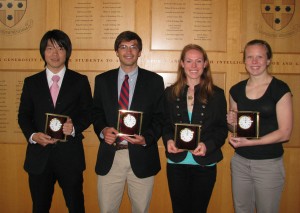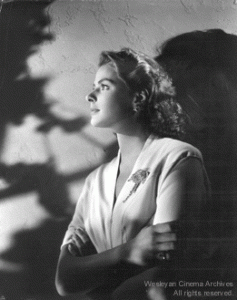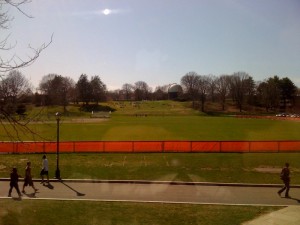Last year in mid April I posted a blog about the challenges of choosing a college or university now that students know into which schools they have been accepted. I thought it might be useful to re-post, with a few revisions.
The thick envelopes (or weighty emails) arrived a couple of weeks ago, and the month of April is decision time. Of course, for many (especially this year) the decision will be made on an economic basis. Which school has given the most generous financial aid package? Wesleyan is one of a small number of schools that admits students irrespective of their ability to pay and seeks to meet full financial need according to a formula developed over several years. There are some schools with larger endowments that can afford to be even more generous than Wes, but there are hundreds (thousands?) of others that are unable even to consider meeting financial need over four years of study.
After answering the question of which schools one can afford, how else does one decide where best to spend one’s college years? Of course, size matters. Some students are looking for a large university in an urban setting where the city itself plays an important role in one’s education. In recent years, campuses in New York and Boston, for example, have become increasingly popular. But if one seeks small classes and strong, personal relationships with faculty, then liberal arts schools, which pride themselves on providing rich cultural and social experiences on a residential campus, are especially compelling. You can be on a campus with a human scale and still have plenty of things to do. Wesleyan is somewhat larger than most liberal arts colleges but much smaller than the urban or land grant universities. We feel that this gives our students the opportunity to choose a broad curriculum and a variety of cultural activities on campus, while still being small enough to encourage regular, sustained relationships among faculty and students.
All the selective small liberal arts schools boast of having a faculty of teacher/scholars, of a commitment to research and interdisciplinarity, and of encouraging community and service. So what sets us apart from one another after taking into account size, location, and financial aid packages? What are students trying to see when they visit Amherst and Wesleyan, or Tufts and Middlebury?
Knowing that these schools all provide a high quality, broad and flexible curriculum with strong teaching, and that the students all have displayed great academic capacity, prospective students are trying to discern the personalities of each school. They are trying to imagine themselves on the campus, among the people they see, to get a feel for the chemistry of the place — to gauge whether they will be happy there. Hundreds of visitors will be coming to Wesleyan this weekend for WesFest (our annual program for admitted students). They will go to classes and athletic contests, musical performances and parties. And they will ask themselves: Would I be happy at Wesleyan?
I hope our visitors get a sense of the personality of the school that I so admire and enjoy. I hope they feel the exuberance and ambition of our students, the intelligence and care of our faculty, the playful yet demanding qualities of our community. I hope our visitors can sense our commitment to creating a diversity in which difference is embraced and not just tolerated, and to public service that is part of one’s education and approach to life.
We all know that Wesleyan is hard to get into (even more difficult this year!). But even in the group of highly selective schools, Wes is not for everybody. We aspire to be a community committed to boldness as well as to rigor, to idealism as well as to effectiveness. Whether in the sciences, arts, humanities or social sciences, our faculty and students are dedicated to explorations that invite originality as well as collaboration. The camaraderie around the completion of senior theses this week says a lot about who we are. We know how to work hard, but we also know how to enjoy the work we choose to do. That’s been magically appealing to me for more than 30 years. I bet the magic will enchant many of our visitors, too.
[tags]liberal arts college, WesFest, Tufts, Amherst, Middlebury, campus feel[/tags]





